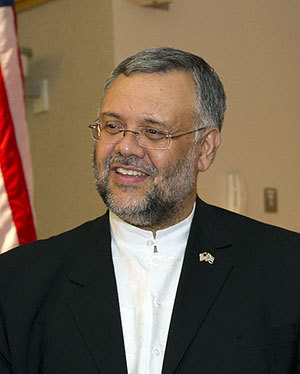 Ebrahim Rasool
Ebrahim Rasool
Ebrahim Rasool, South Africa’s ambassador to the United States, will deliver the 20th annual Rev. Theodore M. Hesburgh, C.S.C., Lecture in Ethics and Public Policy at 4 p.m. April 8 (Tuesday) in the Hesburgh Center for International Studies Auditorium at the University of Notre Dame.
Rasool’s lecture, “Relic of the Past or Template for the Future: Nelson Mandela’s Impact on Peacemaking and Statecraft in the 21st Century,” is free and open to the public.
Before his appointment as ambassador to the U.S., Rasool held numerous positions in the South African government, including member of parliament in the National Assembly, special adviser to the state president of the Republic of South Africa, and premier (governor) of the Western Cape Province. He has a long history of involvement in the anti-apartheid struggle and has been active in both the Islamic and interfaith movements, including efforts to mobilize Muslims and the broader faith communities for a deeper understanding of Islam and faith.
Among his many awards, he is the recipient of the Nelson Mandela Award for Health and Human Rights, presented to him by the Kaiser Family Foundation in 1998.
“I am delighted that Ambassador Ebrahim Rasool has accepted our invitation to deliver the 2014 Hesburgh Lecture,” said Scott Appleby, the John M. Regan Jr. Director of the Kroc Institute for International Peace Studies. “Like his mentor and friend, the late Nelson Mandela, Ambassador Rasool was a courageous leader in the anti-apartheid struggle who was imprisoned and also placed under house arrest by the government.
“In addition to his diplomatic and political skills, he comes to us as an Islamic peacebuilder, experienced in mobilizing people of faith in the nonviolent struggle against oppression. We look forward with great anticipation to his presence among us.”
The annual Hesburgh Lectures in Ethics and Public Policy, established by the Kroc Institute in 1995, honor the Rev. Theodore M. Hesburgh, C.S.C., president emeritus of Notre Dame, a global champion of peace and justice and the founder of the Kroc Institute. Each year a distinguished scholar, policymaker and/or peace advocate is invited by the Kroc Institute director to deliver a major lecture on an issue related to ethics and public policy in the context of peace and justice.
Past Hesburgh lecturers have included Amartya Sen, the 1998 winner of the Nobel Prize in Economics and Lamont University Professor and professor of economics and philosophy at Harvard University, in 2012; Francis Deng, special adviser to the U.N. Secretary-General on the prevention of genocide and mass atrocities, in 2011; Shirin Ebadi, 2003 Nobel Peace Prize Laureate, lawyer and human rights advocate in Iran, in 2009; and Congressman Lee Hamilton, former vice-chair of the National Commission on Terrorist Attacks and former chairman/ranking member of the House Committee on Foreign Affairs, in 2005.
Contact: Joan Fallon, 574-631-8819, jfallon2@nd.edu